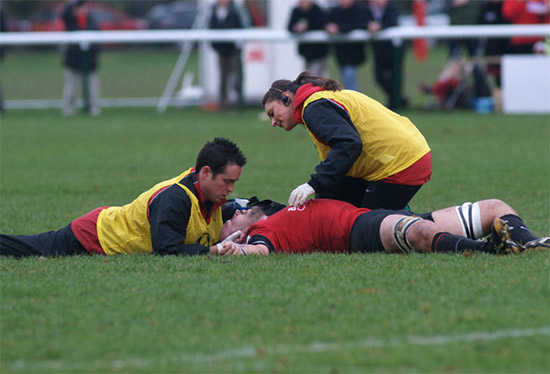Ireland have won the Six Nations championship after England lost 22-16 to France in Paris at the weekend and will have the chance to complete their third grand slam at Twickenham on Saturday!
However, along with the highs must come the lows, and the media have been providing coverage about injuries in this extreme contact sport:
https://www.theguardian.com/
What do the elite medical teams and players do to ensure they are ready for the remaining games?
The key is accurate diagnosis of injuries. A very small hamstring injury may not bother us, but for an elite Rugby winger, it may mean the difference between playing and scoring tries! The results of scans, alongside physical examination and careful player monitoring will allow medical teams to make decisions on how soon a player can safely return to training and playing. Early each morning, medical and coaching staff will meet to discuss the status of every player and typically will be given a clear training status (colour) for all staff to be aware of, eg:

Once training has commenced, some will be watching players, whilst others (physiotherapists) will be working on treatment and rehabilitation of injuries that have a chance of recovering within a one-to-two week period.
Injury Recovery and Injury Reduction tips
Following are some of the practices/methods used by the performance teams to help players recover from matches and help reduce the incidence or impact of injuries:
- Sleep & caffeine Sometimes difficult directly after a match because of stimulants and caffeine used pre-game. Monitoring and minimising their use at times is important, to optimise the healing potential of sleep and its effect on Growth Hormone Levels and muscle recovery/function. Players will be expected to get a minimum of 8 hours and given opportunities for power naps during each training day as well, as required.
- Nutrition Early protein shakes and meals post-game and the following day as the body will be in constant repair and will not be ready for heavy training until 48-72 hours post-game. All their meals and snacks will be prepared for them, with an expectation of some players to be eating 4000-6000 calories a day with high amounts of proteins and carbohydrates post-game/training during recovery periods.
- Active Recovery Ideally getting into a pool the same day or following day and some light bike work and mobility including foam rolling and stretching. It has become common place for yoga and Pilates type sessions to be included in the early days post-game and on lighter training days to help optimise joint and muscle function of each individual.
- Cryotherapy This involves getting into dry cold chambers that can be taken down to very low temperatures, up to minus 250 degrees F. https://www.telegraph.co.uk/rugby-union/2017/02/06/wales-submit-squad-cryotherapy-bid-fit-face-england/
- Massage The team masseurs will be very busy all week every week, often with team rules that state each player should receive at least one to two massages per week in some country’s training camps. This is done to help normalise muscle tone, find non-painful problem areas such as trigger points that may cause issues in the future days to come, but also used as a subtle way of relaxing and communicating with players who may be under high pressure and stress.
- Individual Player monitoring All players will be asked to complete Individual Wellbeing Questionnaires including injury monitoring information. The medical team will perform different daily musculoskeletal monitoring that involves performing joint and muscle tests across the squads or for certain individuals. The purpose of this is it is often believed that there may be a change in the body segments function, prior to an actual report of a pain or problem. Eg hamstring strength/flexibility.
- Education Players are taught to be open and report and communicate with the medical team about all small injuries and illnesses. In the past there was an element of ‘man up’ with injuries and illnesses, but now the culture is changing. A small fire is easier to put out than a larger fire, and dealing with small issues by getting assessment and advice, may mean the difference between performing at a match/event six days later or not.
What can you do?
We can all use these ideas to recover from injury and reduce injury risk:
- Review your sleep patterns/routines and improve where possible.
- Review your diet and ask the question: “is the food that I am putting in helping my muscle to grow/recover and function properly?”
- Have light days, recovery days and do low level cardio-vascular and mobility work after matches and hard sessions
- Cold showers and bath could help post-match, or sessions or Hot/Cold contrast baths.
- Try a massage.
- Use a warm up and some light exercise or stretches to test out stiff and sore body parts to help you decide if your body is ready to train or work hard that day. This prolonged warm up should lead to improved function and help self-assess your readiness.
- Come and get injuries checked early. Many can be very mild in the early stages but can ruin your fitness goals if left unchecked.
